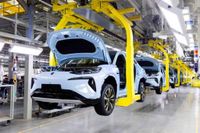In a significant move that could reshape the electric vehicle landscape in the Middle East, Chinese electric vehicle manufacturer BYD has forged a strategic alliance with Saudi Arabia's state-owned oil giant Aramco. This partnership aims to dominate the burgeoning electric vehicle market in the region, posing a direct challenge to Tesla's ambitions.
BYD, already recognized as the world leader in new energy vehicles (NEV), is set to leverage Aramco's extensive resources to enhance its presence in Saudi Arabia, where the government has ambitious plans to increase the share of electric vehicles from a mere 1% to 30% by 2030. This goal reflects a broader strategy to diversify the economy away from its heavy reliance on oil.
As of 2024, Saudi Arabia has only 101 operational charging stations, indicating a significant gap in infrastructure that needs to be addressed to meet future demand. Recognizing this opportunity, BYD opened a showroom in Riyadh in April 2024, positioning itself strategically within the market.
Ali A. Al-Meshari, the vice president of Aramco, highlighted that this partnership will explore advanced propulsion solutions and low-emission fuels, merging innovation with sustainability. This approach aligns with Aramco's commitment to diversifying its operations amid declining global oil prices, which have fallen from $147 per barrel in January to $67 by April 2025.
In stark contrast, Tesla has been facing challenges of its own. The company reported a 13% drop in global sales during the first quarter of 2025, attributed to a delayed refresh of its vehicle lineup and a tarnished brand image. While Tesla has been investing in Superchargers and pop-up stores in Riyadh, its efforts have not matched BYD's aggressive expansion and diverse offerings.
BYD's product range is nearly ten times larger than Tesla's, with vehicles available at various price points, from affordable models under €10,000 to high-end offerings like the Yangwang U9 hypercar. This diversity allows BYD to cater to a broader audience, making it a formidable competitor in the region.
The alliance with Aramco could propel BYD to a dominant position not only in Saudi Arabia but throughout the Middle East. The collaboration between a leading oil company and an electric vehicle manufacturer signifies a shift in the automotive industry, where traditional boundaries are increasingly blurred.
Moreover, the partnership is seen as a strategic move to counter Tesla's influence in the region. As Saudi Arabia accelerates its transition to electric vehicles, it has also initiated the establishment of Ceer, the first Saudi electric vehicle brand, further emphasizing its commitment to this shift.
Aramco's recent announcement of a significant decline in profits—expected to be around $85 billion in 2025 compared to $124 billion the previous year—highlights the urgency for the company to adapt to changing market conditions. The Saudi government, which holds a 90% stake in Aramco, is particularly concerned about the implications of reduced oil revenues on its economy.
In light of these developments, the collaboration between BYD and Aramco represents a proactive approach to addressing the challenges posed by fluctuating oil prices and the global shift toward renewable energy. By investing in electric and hybrid technologies, Aramco aims to ensure its relevance in a rapidly evolving market.
This alliance is not merely a response to economic pressures; it reflects a broader trend of cross-industry partnerships. As the automotive landscape evolves, companies are recognizing the necessity of collaboration to innovate and remain competitive. The convergence of interests between oil and electric vehicle manufacturers could lead to groundbreaking advancements in automotive technology.
Additionally, the partnership underscores the importance of strategic alliances in navigating the complexities of the modern automotive industry. As traditional automakers face increasing competition from new entrants, collaborations like that of BYD and Aramco may set new standards for innovation and sustainability.
While details about specific projects stemming from this partnership remain scarce, the potential impact on the future of mobility is significant. The combined expertise of BYD in electric vehicle technology and Aramco's resources could lead to the development of cutting-edge vehicles that meet the demands of a changing market.
As Saudi Arabia pushes forward with its green mobility agenda, the partnership with BYD may well serve as a model for other countries seeking to transition to sustainable transportation solutions. With the global automotive industry at a crossroads, the collaboration between these two giants could herald a new era of electric mobility in the Middle East.
In conclusion, the strategic alliance between BYD and Aramco not only positions both companies for success in the electric vehicle market but also reflects a transformative shift in the automotive industry. As the world moves toward a more sustainable future, this partnership may play a crucial role in shaping the landscape of transportation in the region and beyond.








